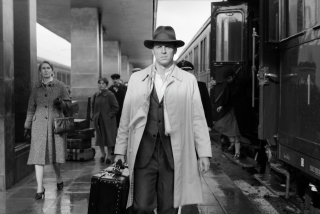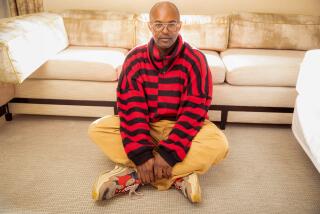‘Inspector’ Trains a Keen Eye on Private Tragedies
The Birlings are having a quiet, pleasant dinner party celebrating the engagement of their daughter, Sheila, to the scion of another prominent industrial family. They are a happy bunch. Then Police Inspector Goole calls, inquiring about the suicide of a young woman.
The effect this news has on the Birlings is profound. Each one, it seems, contributed to her death, including Sheila’s fiance. It’s an intriguing idea, typical of J.B. Priestly, an English playwright whose works are sadly neglected today. The social comment they make is just as valid at the end of the century as it was in the mid-’30s, when it was written.
The Cypress Civic Theatre Guild’s revival of “An Inspector Calls” is flawed, but it demonstrates Priestly’s craft and his obsessive social conscience.
The smug, self-satisfied Birlings are shattered when the stories of their involvement in the suicide come out, and they are all gratuitously guilt-ridden. But when it is discovered that Goole is not really a police inspector, the parents revert to their hypocrisies and overriding complacency.
The young Birlings--Sheila and her alcoholic brother, Eric--realize the tragedy of their own involvement, and Priestly sets up a violent confrontation between the staid parents and the revolutionary youngsters. This is Priestley’s point. The young haven’t been seduced by money and power yet. It’s a sad, touching and often frightening play, and it’s an impressive bit of theatricality. Director J.D. Reichelderfer appreciates that and treats the piece with respect and, more important, understanding. The production’s only major flaw is the lack of variation in rhythms of individual scenes.
Another problem is that a couple of the actors never seem to connect with the script. Jerome Loeb, as the senior Birling, had trouble with lines at Saturday night’s performance and rarely made his character into a real person.
Oddly, Dee Nelson, a transplanted Brit, looks and sounds less British than the American actors in the cast and speaks her lines by rote, without any indication of who Mrs. Birling really is.
The rest of the company is fine. The most solid performance is Casey Long’s as dissolute son Eric. At first, he’s a snappish, egotistic brat, but he mellows into a young man who, having been shattered by his coldness to those around him, especially the suicide victim, becomes vulnerable and open.
Almost as strong is Sophie Areno as his distraught sister, at first with an appealing naivete, later an indignant, wiser, more thoughtful young woman. Tony Howley is good as Sheila’s fiance, a glib, harming spin-artist, weaving his own vision of what is happening.
The core role, of course, is Inspector Goole, and Shawn Berry makes of him an intriguing vigilante, whose fire-and-brimstone speeches in the third act are effective and theatrical. They would be even more interesting, and memorable, with a little restraint.
* “An Inspector Calls,” Cypress Civic Theatre, 5172 Orange Ave. 8 p.m. Friday-Saturday, 2 p.m. Sunday. $10 ($12, Sunday only). Ends April 10. (714) 229-6796. Running time: 2 hours.
Jerome Loeb: Arthur Birling
Tony Howley: Gerald Croft
Sophie Areno: Sheila Birling
Casey Long: Eric Birling
Dee Nelson: Sybil Birling
Shawn Berry: Inspector Goole
A Cypress Civic Theatre Guild production of J.B. Priestly’s drama. Produced by Sue McClanahan, Melissa Pearson. Director: J.D. Reichelderfer. Scenic design: Brian Sunley. Lighting design: Chris Conrad. Costumes: McClanahan. Stage manager: Lisa Heath.
More to Read
The biggest entertainment stories
Get our big stories about Hollywood, film, television, music, arts, culture and more right in your inbox as soon as they publish.
You may occasionally receive promotional content from the Los Angeles Times.










